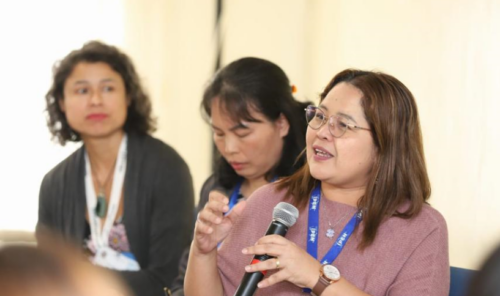USAID Shares Key Recommendations for Developing Inclusive Extended Producer Responsibility Frameworks in Support of International Plastics Treaty Negotiations

November 2023 – As negotiations continue to develop the first legally binding agreement on plastic pollution by 2024, the U.S. Agency for International Development (USAID) joined global leaders at the third session of the United Nations Intergovernmental Negotiating Committee (INC-3) on plastic pollution in Nairobi, Kenya from November 13-19, 2023.
USAID shared lessons from Clean Cities, Blue Ocean, the Agency’s global flagship program under the Save Our Seas Initiative, on a key component of the treaty – developing and implementing inclusive Extended Producer Responsibility (EPR) systems that incentivize increased recyclability, promote higher recycling rates, and enhance the accountability of producers for environmentally sound management of plastics and plastic products throughout their life cycle. As cited in the Zero Draft Text for the treaty, such systems must also enable a “just transition that promotes and facilitates a fair, equitable, and inclusive transition for affected populations, with special consideration for women and vulnerable groups.”
In the lead up to INC-3, USAID’s Clean Cities, Blue Ocean program released a case study, Extended Producer Responsibility: A System for a Circular Economy, sharing the model used, experiences, and lessons learned from supporting national governments to develop and implement EPR systems. Since 2018, USAID has provided support to countries to develop EPR frameworks–by bringing together government and industry representatives and environmental specialists to develop EPR Roadmaps to establish and agree upon the necessary steps for implementation. In Sri Lanka, for example, USAID helped design, develop, and implement an EPR system that provides a policy and legislative cornerstone in enabling a circular economy. The work fostered public-private partnerships to identify and solve end-of-life waste management challenges, created a verifiable reporting system to monitor progress and track commitments, and established a regulatory environment that aligned with stakeholder input. The case study highlights the agency’s partnership with Sri Lanka, which now for the first time, has the necessary framework and commitments from the private sector to support an EPR system, and is able to quantify the volume of plastic materials being recovered and recycled through this new model.
On the heels of the negotiations, on November 8, USAID and its Clean Cities, Blue Ocean program also held a webinar, From Plastic to Progress: Creating Inclusive Extended Producer Responsibility Systems around the World, bringing together public and private sector representatives from Kenya, Sri Lanka, and the Philippines to share their experiences in developing and implementing inclusive EPR frameworks. Key takeaways showed that although countries undoubtedly have specific circumstances and challenges, there are several common themes that arise as low and middle income countries embark on EPR development:
- A multi-stakeholder process is critical, with meaningful and frequent consultations with the private sector, informal sector, and local governments who are ultimately responsible for waste management.
- In addition to partnerships, presenters highlighted the importance of data, not only to measure progress and identify areas for improvement in waste collection, but also to establish baselines that accurately represent the contribution of the informal waste sector.
- Flexibility is mandatory, acknowledging that EPR is an evolving process, and developers need to continuously learn and adapt to make it effective to each country’s context.
On the ground, on November 16, Clare Romanik, USAID’s Lead Ocean Plastics and Urban Advisor, moderated an official side event with representatives from the 1971 Ramsar Convention on Wetlands, the Basel, Rotterdam and Stockholm (BRS) Conventions, the Vietnam Zero Waste Alliance, Action Network for Environmental Rights (Red de Acción por los Derechos Ambientales, RADA), and EcoWaste Coalition (Philippines). During the session, panelists shared lessons learned from other conventions, insights from civil society, and challenges faced by national and local governments to identify the key elements needed and design factors to consider for a global agreement to be successfully implemented at regional, national, and local levels.
For USAID’s part, Ms. Romanik and Ms. Aileen Lucero of EcoWaste Coalition–a USAID Clean Cities, Blue Ocean partner–shared lessons learned from their experience implementing effective, locally-led solutions that address plastic pollution in ten countries and more than 25 cities around the globe. Many countries have poor infrastructure due to the lack of financing and also have poor implementation of laws. Although national legislation will be the backbone for treaty implementation, developing a shared multi-stakeholder responsibility will be important for all stages from establishing baseline data, to developing targets, and identifying policies that will not hurt livelihoods, especially of the most vulnerable populations. A ‘start and strengthen’ approach in the treaty will allow countries to increase ambition over time once they have established EPR systems that can inject a sustainable funding stream into recycling and solid waste services.
Key policy considerations resulting from the event – organized by the UN Development Program (UNDP), USAID, the Norwegian Retailers Environment Fund (Handelens Miljofond), Red de Accion por los Derechos Ambientales (RADA), and Pacific Environment – included:
- The treaty must include adequate means of implementation, including financial mechanisms, capacity building and technology transfer to ensure effective participation of all countries. EPR can be an effective financing mechanism for strengthening waste management systems and incentivizing reuse/refill, recycling and improved package design. Parties should also provide appropriate financial and technical support to their cities, towns, and other subnational governments for capacity building and infrastructure investment.
- National plans should have binding targets and control measures.
- The treaty must recognize traditional and indigenous knowledge and ensure an inclusive process, including for waste pickers.
Building on the lessons from the first year and a half of USAID’s Save Our Seas Initiative and work under the Clean Cities, Blue Ocean program, USAID will continue its support to countries to advance these recommendations. For more information, visit www.urban-links.org/issue/ocean-plastic-pollution/.
Related knowledge products and resources:

